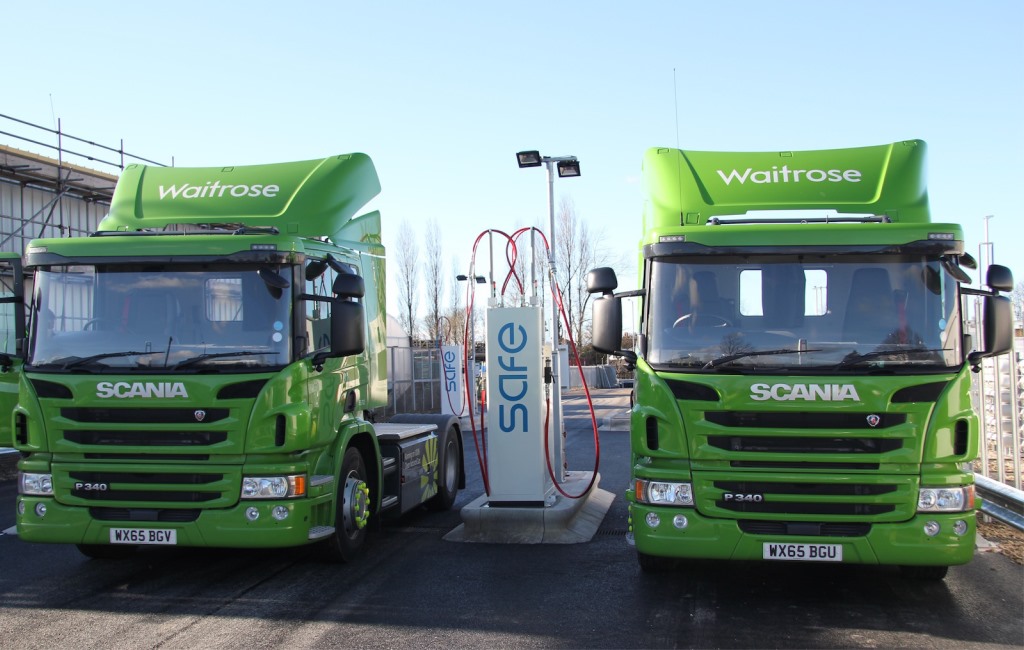UK-produced Green Gas now being used to fuel vehicles
- Renewable Energy Association welcomes growing number of hauliers switching to biomethane fuel.
- UK-produced green gas production forecast to soar to meet rising demand from British transport sector.
- Biomethane 30%-40% cheaper than diesel fuels and has potential to reduce HGV GHG emissions by 70%.
A growing number of commercial haulage operators are clamouring to improve their environmental credentials by running haulage trucks on green gas. Whilst some green gas has been imported, domestic producers have so far been limited to supplying the heat market.
Now that the first transport fuel supplier has succeeded in earning Renewable Transport Fuel Certificates (RTFCs) for UK-produced gas, a new route to market has been demonstrated. The overall production of green gas is now expected to increase, as producers are likely to ramp up their production.
According to the REA, the biogas sector currently employs around 3,000 people across the UK supply chain; with the sector turning over around £356m annually.
Philip Fjeld, Chief Executive of CNG Fuels Ltd, said:
“It has taken a while to get the administrative ducks in a row, but happily we’re now passed that stage. Last week our application for RTFCs was approved, showing it’s possible for gas to grid projects to be flexible regarding where their green gas goes. They can send some of it for general decarbonisation of the gas grid, and some can be allocated to refuelling heavy goods vehicles. We are experiencing very strong demand growth for our biomethane fuel from hauliers and going forward we are excited to increase our sourcing of green gas from domestic producers”
Jesse Scharf, Scheme Manager, Green Gas Certification Scheme, said:
“We’re delighted to have been involved in the first case of RTFCs being issued for UK biomethane tracked via the grid into vehicles. We expect biomethane supplied to transport to increase significantly over the next 12 months and look forward to helping more plants access this market”
Gaynor Hartnell, Head of Renewable Transport Fuels, Renewable Energy Association, said:
The Renewable Transport Fuel Obligation is doubling in size this year and too much of our renewable fuel and feedstocks are imported. It’s great to see a new, additional source of supply becoming available domestically. Existing producers will be ramping up their output to meet this demand, and in a few years’ time it looks like the Renewable Transport Fuels Obligation will be the driving force for new project development.”
—ENDS—
For more information or to request an interview, please contact:
Mark Hofman
External Affairs Manager
+44 (0)20 7981 0862
[email protected]
Notes for editors
- The Renewable Energy Association set up the Green Gas Certification Scheme in 2011.
- There are 46 producers on the scheme, with the capacity to produce 2,500 GWh of gas per year, enough to meet the needs of a city the size of Bristol. The scheme has 42 supplier members, and is also working with Calor to track biopropane through their network For more information about the Green Gas Certification Scheme see www.greengas.org.uk or contact Jesse Scharf on [email protected]
- CNG Fuels develops, owns and operates CNG distribution infrastructure including refuelling stations, trailers and vehicles – dispensing compressed biomethane that has been mass balanced via the grid. www.cngfuels.com
- Switching from diesel to biomethane offers carbon savings of over 70% as well as improving air quality and reducing engine noise. Biomethane production can utilise wastes and residues produced by households and food manufacturing processes and plays a key role in the circular economy.
About the Renewable Energy Association (REA)
The Renewable Energy Association represents renewable energy producers and promotes the use of all forms of renewable energy in the UK across power, heat, transport and recycling. It is the largest renewable energy and clean technology (including energy storage and electric vehicles) trade association in the UK, with around 550 members, ranging from major multinationals to sole traders.
For more information, visit: www.r-e-a.net

